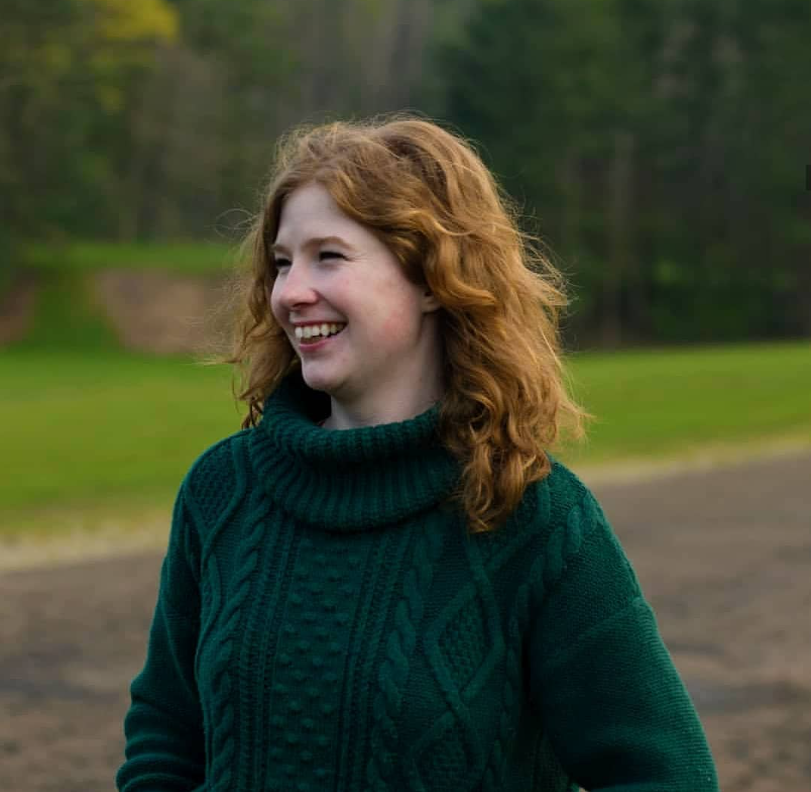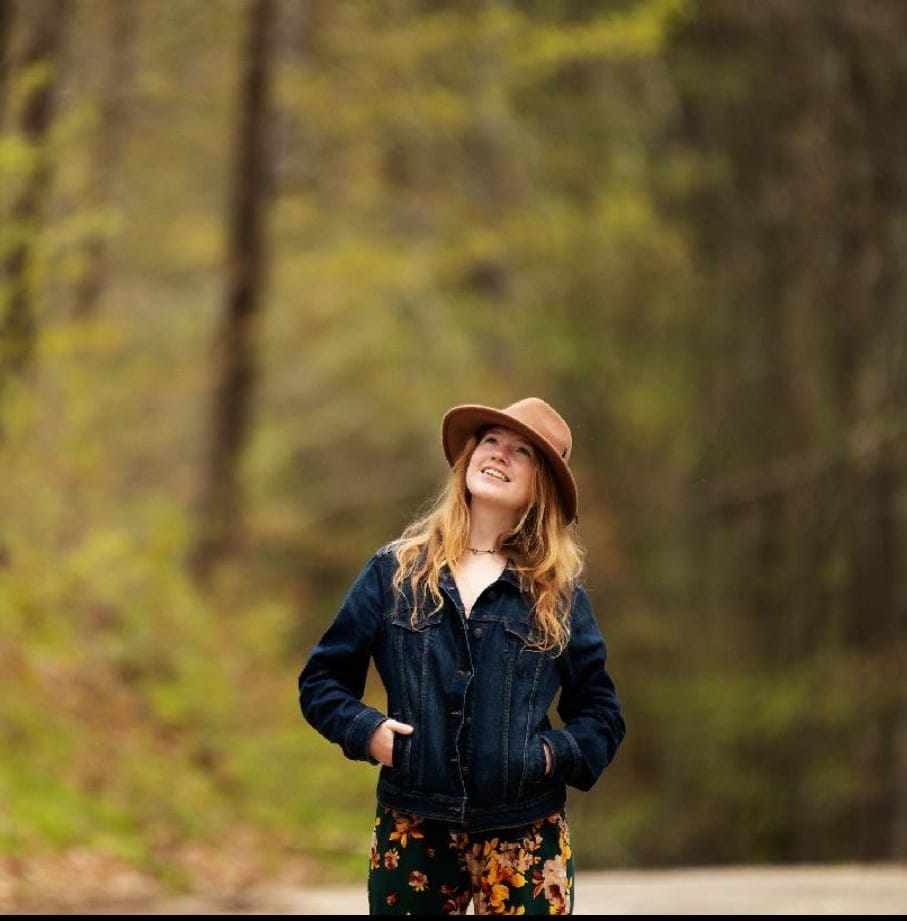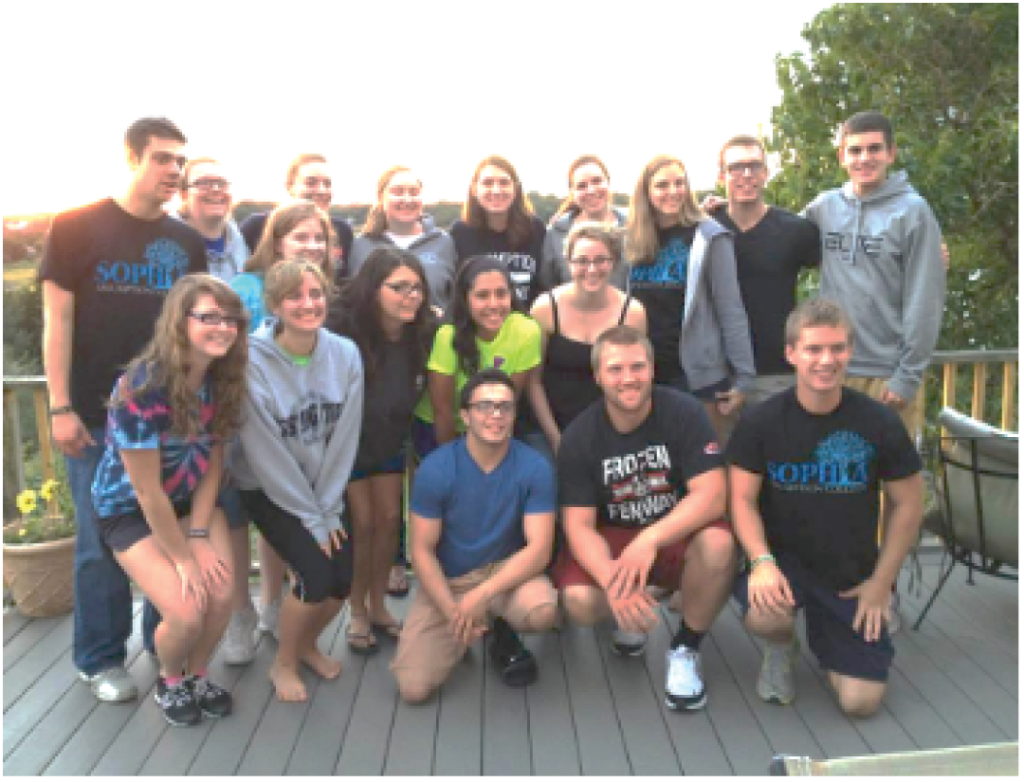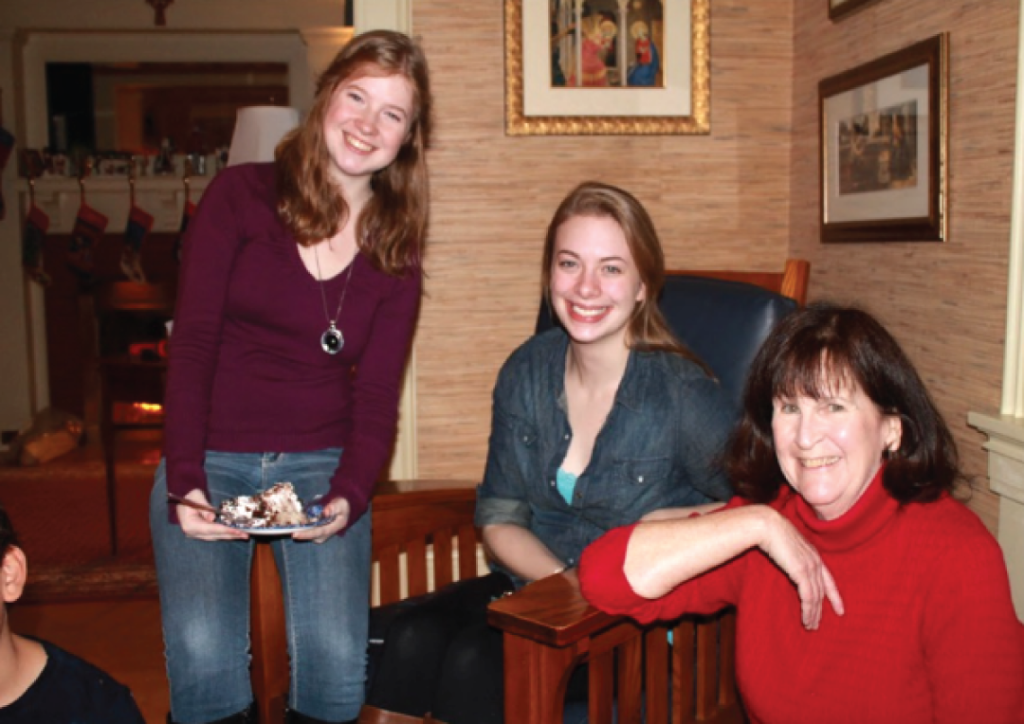Be Open to Change.
An Interview with Sharon Caulway ’15 by Caitlin Sze ‘24
Hounds with Purpose is a space for alumni to share their stories of purpose and vocational engagement beyond their years at Assumption. This blog is created by the Center for Purpose and Vocation and the Career Development and Internship Center (CDIC) to better connect students and alumni through experiential storytelling.
Sharon Caulway ‘16 graduated cum laude from Assumption in Fall of 2015. As an undergraduate, her major was in History and had minors in Medieval and Early Modern Studies, Spanish, and Foundations Program. She was in the Honors Program and on Dean’s List every semester. After graduating from Assumption, Sharon worked in both a public library and a college library. In addition to library work, Sharon has worked in journalism and wildlife conservation. She has now returned to Assumption as the Library Services Coordinator and currently resides in Charlton, MA.
Caitlin Sze ’24 is currently finishing her MBA in Management. This year, she is the Graduate Assistant for Marketing, Communications & Event Management in the Career Development and Internship Center on campus. Prior to Graduate School, she attended Assumption University for her undergrad, where she received a B.A. for a double major in Graphic Design and Communications and Media. She is the Assumption University Women’s Tennis Team captain and lives in South Windsor, CT.
Tell me about yourself. When did you decide to study here and how did you know you wanted to study History?
I’m from Charlton and my sister Alexandra Caulway 14’was a student here first. My sister is two years older than me, so I had already visited the campus a few times before I started my college search. When you’re trying to pick colleges, something as small as already knowing the campus can help you decide. In my case, I already felt a little more confident here. Having my sister at Assumption also helped me to get to know some friends and a few professors just from walking around the campus during visits. That was part of why I decided to come here. Plus, it’s close to home. However, when I came, I was undecided. At that time, I had a hunch that anthropology was going to be my focus because I knew that I loved learning about different cultures and in history classes and geography in school I was always the one asking the teacher, “But what are the people actually doing with their day?” I didn’t really care about the kings and the powerful people’s history. I cared about what the peasant was doing. What I wanted to know is what the actual normal people do with their time, so I started out thinking about studying anthropology. I think I took cultural anthropology and some archaeology, and I ended up shifting more to general history along the course of my time at Assumption. One of the highlights of my history degree while I was an undergraduate student is that I got to do an internship at the Higgins Armory Museum, which closed right after I interned there, but the castle is still here in Worcester. I was one of the people in the museum doing the tours and guiding visitors and leading shows about medieval armory and history. I think my history focus ended up being on the medieval era, but I still didn’t really know what I wanted to do with it. I knew that I was more interested in History for talking with people than for writing scholarly papers in a more solitary kind of job, so I ended up deciding on History as my major and minors in Spanish and in Medieval and Early Modern Studies, which I think was a brand-new program at the time. I did not know what I was going to do when I started. I think that’s something great about going to a liberal arts school because you have options. You’re not limited to just focusing on a single discipline, for example, business or writing, you are expected and encouraged to take different classes from across various disciplines and find connections between them.
Besides having a sister already studying at Assumption, what other factors helped you to decide to attend Assumption?
I remember doing the pros and cons that most people do when one makes a big decision. I think some big factors for me were already knowing campus, knowing how much my sister loved Assumption because she really did, and then getting to be close to home because I wasn’t a child who ever went to summer camp. Growing up, I really didn’t leave home very much, so being close to home was important and my parents really liked that they could come visit every now and then. I could go home for the weekend and come back if I needed to, so I think it was the combination of all those things. I already liked the feeling of campus and how nice everyone was. As I’ve said, I liked how close Assumption was to my home, but I also knew from my sister that she was having a really good experience here. It is a great plus when you know someone here and you’re visiting. You get to see the dorms and you get to see a different side of campus life beyond the one-hour tour. It’s almost like talking to the locals when you go on a vacation. Since I was in the Honors Program, I started living in Hanrahan Hall. I think my favorite dorm was the LLC.
What was your transition from high school to college like?
I went to the Shepherd Hill Regional High School in Dudley, MA, which is a district high school, so the student body mostly came from the towns of Charlton and Dudley. I really loved high school and school in general. I had such good teachers in 8th grade that I genuinely didn’t want to leave 8th grade because I was so happy. When I came to college, I think the first year I remember being sad when I would leave to go home during the breaks. I think the first year you’re so excited because you’re meeting all these new friends. I remember bringing a box of tissues as I was preparing myself to cry on move-in day after saying goodbye to my parents, but I was just like, “Bye. I’m busy now.” I was actually very excited to meet new friends. One piece of advice I remember people kept telling you to keep your door open as often as possible. Everybody was encouraged to do that. Otherwise, it would have been easy to start going to your classes and then going back to your room and shutting your door. Even in my later years at Assumption, a big thing was keeping my door open.
Are you still in touch with some of the friends you met at Assumption?
Yes, I have my friend Erin with whom I am still in touch. We were both in the Honors dorm freshman year and we ended up being roommates later and then I have several other friends that I’m still in touch with. Many of them are from the SOPHIA program.
As a sophomore, Sharon was a member of the first cohort of SOPHIA Collegians in 2013. The photo is from a SOPHIA retreat on Cape Cod.
You mentioned some professors that you had at Assumption. Was there one that stuck to you or one that helped you throughout your years at Assumption?
Professor Geoffrey Vaughan, who is still here, helped me a lot. The professors in the Political Science Department plan “Pizza, Politics, and Punch” nights, for some debate and discussion, and I have attended some of those events again since being back at Assumption because Prof. Vaughan is usually there along with Professor Geddert, who I also had for class. I enjoy going back to their classes and listening to their lectures. They have a way of teaching that is accessible to everybody. There is something about political science and philosophy that can be intimidating to people, and they feel like it is going to be hard, but Professor Vaughan makes everybody in the class feel at the same level. Everyone I know has loved having classes with him.
What made you choose to come back to Assumption to continue your career here?
It kind of makes sense when you look back at the trajectory of my interests and skills. I first started out with the museum internship and then I ended up having another internship at the Worcester Historical Museum. A couple of years later, I did some archival work. In college, I also had a work study job working in IT. I don’t think they have this anymore, but it used to be student worker job where you would go out if someone called from their dorm room and had a problem with their TV or a professor was having a technological problem during class. A group of us would be sent out to help solve the issue. This job gave me a bunch of basic troubleshooting IT skills. In my first job after college, I was able to combine this IT experience with my other museum and archival skills. After college, I ended up getting a job at the Charlton Public Library, which is my hometown library. Because I had IT experience from the student worker job, a lot of work I did in the library was IT. I did some troubleshooting with the printers, answered website questions, or provided support with research questions. Prior to working in the Emmanuel d’Alzon Library, I had a full-time job at Becker College. Now, I’m glad to be back here. I missed being in an academic setting able to come into the office to engage and talk to students and faculty. I loved learning here at Assumption and I loved all the people here. When I saw the job opening, I felt like I had the required skills for the position. I was looking for an opportunity like this to bring me back to a place where I was happy and where I could continue to learn all the time. It’s been so nice to see a lot of the same people, but I’ve also gotten to meet a lot of new people.
What advice can you give to students who are starting their first year here, or are looking at the next chapter of their life post-graduation?
The biggest thing is being adaptable and adapting to what’s going to happen to you. You should also just be okay with the fact that things might change. I remember there was this quote from Frederick Buechner we talked about in the SOPHIA program. It went something along the lines of “Vocation is the place where our deep gladness meets the world’s deep need.” At the time, I used to think of it as a formula thinking, “Okay, I like to do this in the world and the world could use more of this, so I will do the job that combines those two things.” Soon, I realized that both what I like and what the world needs could change, so you do need to be adaptable because your interests will change in life like the world’s needs might change. Being open to change is the biggest thing. There seems to be this idea that in your 20s you are supposed to figure everything out like here is a job, here is a relationship, here is where I am going to live, but I know a lot of people my age are still figuring things out. I remember being 22 and being anxious because I felt like I needed to know everything, and every single decision felt like such a huge deal. When you talk to people who are 35 or 45 or 55 or older, a lot of them will tell you to calm down because everything is going to work out in the end. Many people I know in their 50s and older are the most confident and relaxed. They don’t sweat the small stuff and that’s something hard to remind yourself of when you’re a new college student. So, overall, just keep in mind that your interests are going to change, and your career might change, but you need to be okay with that.
Being where you are now, do you wish you could go back and redo something, or go back to a point in your life?
No, simply because you don’t have ways of knowing which things lead to other things. There is a book called The Midnight Library by Matthew Haig and it talks about getting the chance to go back and look at different aspects of your life. To me, if I did this one thing differently, my life would be different, but each decision has its flaws as well. I have so many things in my life that I love now so I wouldn’t want to change anything because I have no way of knowing if that one class, I took ended up leading me to this job or this opportunity or that one person I met might have led to this. That’s another great thing about Assumption because you meet so many people and networking is always relevant in the world of careers and in general. You never know when you are going to see that person later in your life and I didn’t know that when I graduated that I would end up back here. It’s nice to not know what is in the future.
Assumption’s SOPHIA Program provides sophomore students with opportunities for vocational engagement with dedicated faculty mentors. Sharon is photographed with her friend and fellow SOPHIA Collegian Julia Shea and Dr. Carroll-Keeley, one of the SOPHIA professors.
How would you define success? Are there certain values that you associate with success?
I’m going to define success as doing work that makes you feel satisfied at the end of the day but also feeling like you’ve been helpful to others. Making other people’s day better is a big part of why we’re here but you also need to make sure you are happy. Not only do I work here but I work part time at a nature organization. At my other job, success means helping one person start to be interested in nature by learning about birds or by donating to help fight against climate change. Sometimes I feel like I helped someone that day even if it’s just by feeding a bird. So, I really like to think of success as that: where you don’t have to be selfish to be successful… you can be successful without doing anything that involves just yourself. You can be successful by helping a lot of people AND be happy and there are so many opportunities in the world to do that. For values I guess impact would be my value because I like to do work that makes it feel like I made someone’s day better and helped somebody achieve something. Even if I’ve just made somebody smile or laugh, I think there is value in the small little things that you do throughout the day. Another thing to think about is to think about the bigger picture and question things a lot. That is something they teach you in your philosophy and theology classes which is interesting. Assumption really does combine practical skills for finding jobs and a career with thinking about bigger abstract ideas and discussing them with other people and feeling fulfilled from that discussion.
What are some of the biggest lessons you learned at Assumption? Can you please share a particular story about one of these lessons?
Some of the biggest lessons that I learned involved being open to ttherrying new things. There were always interesting guest lectures held on campus, or exciting events like talent shows or stand-up comedian performances, and I tried to attend many times even if I didn’t feel like leaving my dorm room. I was always happy that I’d gone: I learned new things at those lectures, or met interesting new people during those events, and pushing yourself to try something new can be a great tool for your career, as well. This lesson was particularly relevant during my internship at the Higgins Armory Museum while I was an Assumption student. While interviewing for the internship, I was asked if I would be willing to take on a public-facing role that involved performing educational shows in front of audiences regularly. I dreaded public speaking and dreaded presentations, but I deliberately asked to be chosen for that specific role anyway. I was nervous before every show for a long time. But, by the end of the internship, I was performing a one-woman show about medieval armor in front of large audiences several times a week. I learned a lot during those performances, and I was able to work with some wonderful people at the museum; if I hadn’t taken on the internship, and signed up for that challenge, then I might have missed out on some valuable experiences!
To conclude this interview, what values bring meaning and purpose to your life now? Is there any last thought you want to share with students during their time at Assumption?
It is helpful to play around with your perspective a lot while you’re here. The professors do a great job doing this especially in classes about philosophy or theology, but it can really help if you mentally put yourself in the shoes of the people around you. I remember how in History class with Professor Wheatland, for example, he showed a black and white photo of someone from World War II. I continue to have a vivid memory of myself imagining being that person. I would really try to put myself in their shoes and to think about what it would be like to be them at that moment. Then, I would leave that class thinking about something horrible that that person went through and wondering what it was like for them while the person next to me would be complaining about the food on the dining hall menu. I would just tell them that’s not a big issue at all. I think it really does come down to your perspective and how practicing changing your perspective can really be helpful especially when you leave college and you’re entering the workforce.








